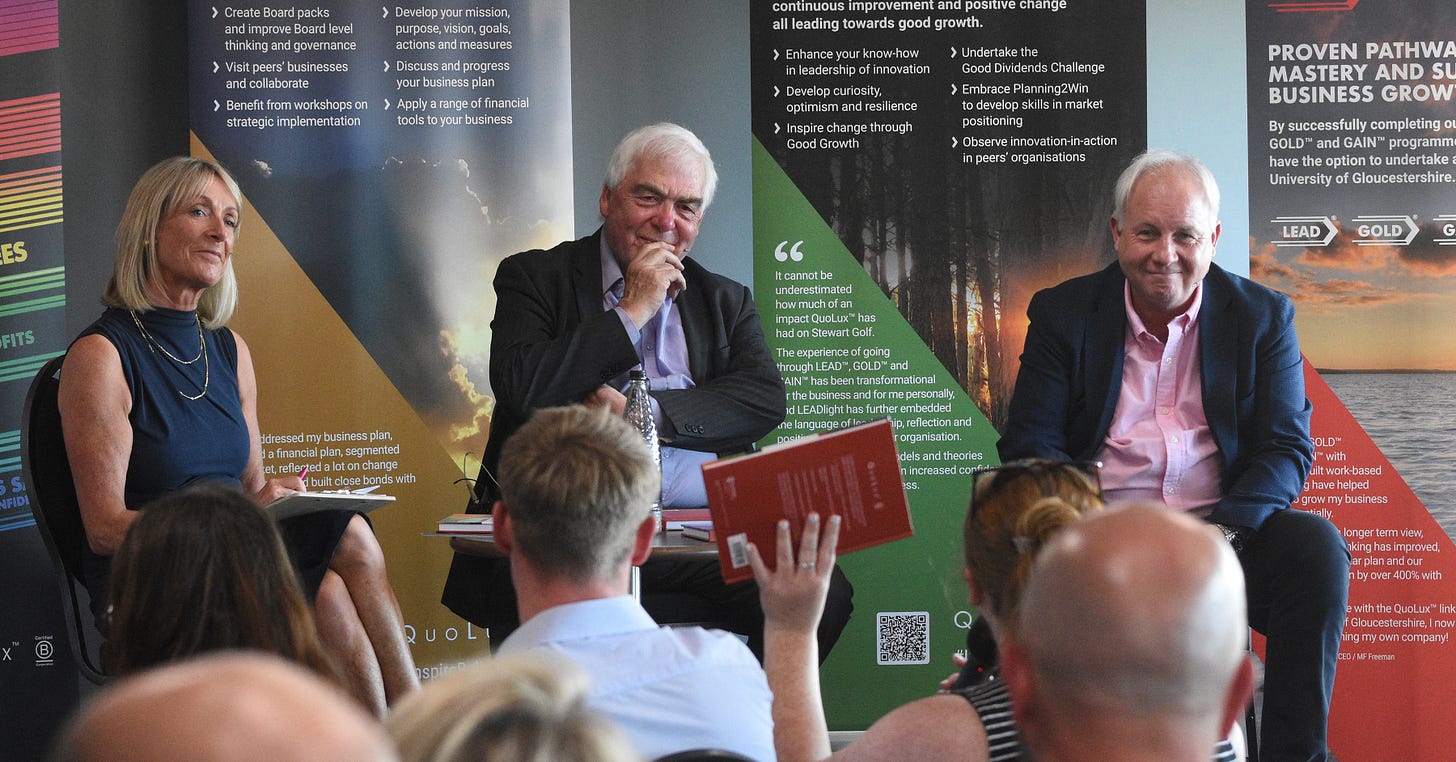Book launch reveals the most powerful business group in Gloucestershire
It was all about the launch of a book on financial leadership, but it revealed probably the most powerful group of businesspeople in the county – a group that could be about to influence government.
Dear reader,
Welcome to our Thursday story, ahead of a packed full Friday edition tomorrow.
Regular readers will know we often paywall our Thursday features to help pay for what we do - real, independent
journalism about our county of Gloucestershire.
Those same readers are probably fed up of hearing this refrain, but we repeat it because we continue to gather subscribers and don’t want the first email they read from us to put them off if it’s paywalled. So please bear with us.
Saying that, today, there are no paywalls! Mainly because this is a single report featuring one of The Raikes Journal’s key Founding Partners.
So much of what was said at its event at Gloucester Rugby on Monday evening that is the subject of the read below was worth reporting, but we have left that to the video we’ve also embedded below.
What we do think is worth underlining, and do so, is that the gathering showed the might of the business family that is forming as a result of the work companies are doing with QuoLux.
And it feels safe to say we are now looking at potentially the most powerful business voice in Gloucestershire - even if it doesn’t know it yet!
Very best regards,
Andrew Merrell (editor).
For every person you refer to The Raikes Journal’s email service you get points towards a free membership allowing you to see beyond our paywalls. Please do sign up (free or otherwise), send the referral link to a friend or colleague, and help us grow.
* The Raikes Journal is a digital magazine and community interest company whose supporters believe, like us, that journalism about Gloucestershire is worth keeping alive. Everything you read here - original stories about our county - is made possible by our incredible Founding Partners: QuoLux, Willans LLP, Gloucestershire College, Merrell People and Randall & Payne; our sponsors, Founding Members and wonderful paying subscribers.
If you upgrade to paid you’ll be part of this CIC too. We’re dedicated to championing the county, its businesses, charities, education and training providers, and to creating an even stronger community. If you upgrade to paid you’ll be able to see past the paywalls often put on our 2cnd and 3rd email editions of the week, that lock our archive after two weeks and our Top 100 Businesses in Gloucestershire series. You’ll be able to comment on our stories too.
You can sign up for just £2.30 a week - or £1.80 a week if two or more people sign up at once. Or go all in and become one of our Founding Partners or Founding Members!
Book launch reveals the most powerful business group in Gloucestershire
It was all about the launch of a book on financial leadership, but it revealed probably the most powerful group of businesspeople in the county – a group that could be about to influence government.
By Andrew Merrell.
A government seeking a formula to drive economic growth needed to look no further than Gloucester Rugby Club on Monday evening. In fact, a regular at Downing Street was in the room listening.
This was the launch of a book its authors, a Gloucestershire businessman and an academic and former Government advisor, believe contains a message powerful enough to transform millions of companies.
But it was also an event that suggested something else - a changing of the guard in Gloucestershire and the emergence of a significant new voice for business in the county.
There were 150 guests at Kingsholm Stadium’s Captain’s Lounge - leaders of some of the county’s most dynamic and fastest-growing companies, plus policymakers, anchor organisations like the University of Gloucestershire, representatives from local government, and more.
Others tuned into the live stream from Australia, Malaysia, Denmark, Germany, Brazil, Canada and India, to watch authors, Dr Stewart Barnes and Professor Malcolm Prowle, were quizzed by journalist and presenter, Jill Douglas MBE.
It was an audience of the calibre not seen since one of GFirst LEP’s annual gatherings, back when the local enterprise partnership was in its prime, and an event that would not have looked out of place high up the bill at the Cheltenham Literature Festival.
Except this was Gloucester - and this was a book about the niche subject of Developing Financial Leadership in Small-Medium Businesses, co-written by Barnes and Prowle and published by British multinational publisher Routledge.




